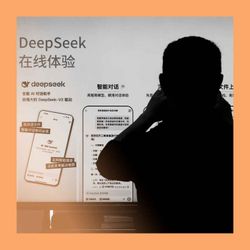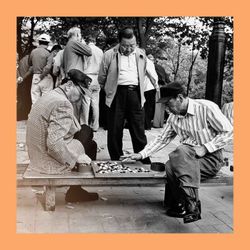Share

Drum Tower
Drum Tower: Back to the future
•
As China re-shapes the existing world order, its officials argue that the values behind it are Western and not universal. Western leaders worry that China is merely trying to make the world safe for dictatorships. Do universal values exist?
The Economist’s Beijing bureau chief, David Rennie, and senior China correspondent, Alice Su, talk to Zhou Bo, a former senior Chinese army colonel, and to Zha Jianying, a Chinese writer in New York.
Sign up to our weekly newsletter here and for full access to print, digital and audio editions, as well as exclusive live events, subscribe to The Economist at economist.com/drumoffer.
More episodes
View all episodes

China’s tropical free-trade experiment
30:25|China wants to turn the island province of Hainan into the world’s largest free-trade port. Can the island overcome a history of booms and busts to succeed? Hosts:Jeremy Page, co-host of “Drum Tower” Sarah Wu, co-host of “Drum Tower” Topics covered: Hainan Free Trade PortChina’s trade policyMedical tourism in ChinaTranscripts of our podcasts are available via economist.com/podcasts.Listen to what matters most, from global politics and business to science and technology—subscribe to Economist Podcasts+. For more information about how to access Economist Podcasts+, please visit our FAQs page or watch our video explaining how to link your account.
Why China is causing alarm in the Arctic
31:13|In 2018 China claimed to be a “near-arctic state”. So why is it now downplaying its involvement in the region—and will its ambitions change?Hosts:Jeremy Page, co-host of “Drum Tower” Sarah Wu, co-host of “Drum Tower” Topics: Arctic policy of ChinaPolar silk roadGreenlandTranscripts of our podcasts are available via economist.com/podcasts.Listen to what matters most, from global politics and business to science and technology—subscribe to Economist Podcasts+. For more information about how to access Economist Podcasts+, please visit our FAQs page or watch our video explaining how to link your account.
China’s DeepSeek year
33:35|In January 2025, a little-known Chinese firm stunned the world. A year later, we examine DeepSeek’s influence on the AI industry at home and abroad. When the startup releases its new model this month, what will the impact be?Hosts & Guests: Sarah Wu, co-host of “Drum Tower” Alex Hern, The Economist’s AI writer Topics: DeepSeekChinese AI industry Large language models Transcripts of our podcasts are available via economist.com/podcasts.Listen to what matters most, from global politics and business to science and technology—subscribe to Economist Podcasts+. For more information about how to access Economist Podcasts+, please visit our FAQs page or watch our video explaining how to link your account.
Why China is promoting skills over degrees
26:59|China has too many graduates and not enough jobs for them. The government is pushing vocational training as the solution, but will it work? Hosts: Sarah Wu, co-host of “Drum Tower”Simon Cox, The Economist’s China economics editor Topics covered: Vocational education in ChinaGraduate unemployment in ChinaChina’s economyTranscripts of our podcasts are available via economist.com/podcasts.Listen to what matters most, from global politics and business to science and technology—subscribe to Economist Podcasts+. For more information about how to access Economist Podcasts+, please visit our FAQs page or watch our video explaining how to link your account.
Strait-talking: the Taiwanese politician who wants to meet Xi Jinping
38:11|As China ramps up military drills around Taiwan and American support for the island appears to be wavering, Taiwan’s opposition leader is arguing for closer ties with the mainland. Cheng Li-wun sits down with Drum Tower to explain why. Hosts: Jeremy Page, The Economist’s China chief correspondent and Sarah Wu, our China correspondent.Guest: Cheng Li-wun, chair of the Kuomintang (KMT), Taiwan's largest opposition party.Transcripts of our podcasts are available via economist.com/podcasts.Listen to what matters most, from global politics and business to science and technology—subscribe to Economist Podcasts+. For more information about how to access Economist Podcasts+, please visit our FAQs page or watch our video explaining how to link your account.
Go-ing nowhere: the bust-up dividing East Asia
36:17|Go, one of the world’s oldest board games, is played across China, Japan, and Korea. But a dramatic row over the rules is inflaming age-old tensions between the three countries.Hosts: Jiehao Chen, our China researcher and Jeremy Page, The Economist’s chief China correspondentTranscripts of our podcasts are available via economist.com/podcasts.Listen to what matters most, from global politics and business to science and technology—subscribe to Economist Podcasts+. For more information about how to access Economist Podcasts+, please visit our FAQs page or watch our video explaining how to link your account.
War of words: the jailed tycoon taking on the state
30:20|Since his arrest on charges of financial crime in 2019, one of Hebei’s richest businessmen has been held without trial. Now, he’s penning scalding criticism of local officials, and appealing to Xi Jinping from behind bars.Hosts: Sarah Wu, The Economist’s China correspondent and Don Weinland, our China business and finance editor.Guest: James Zimmerman, Beijing-based lawyer and writer.Transcripts of our podcasts are available via economist.com/podcasts.Listen to what matters most, from global politics and business to science and technology—subscribe to Economist Podcasts+. For more information about how to access Economist Podcasts+, please visit our FAQs page or watch our video explaining how to link your account.
Strike force: What China will learn from Venezuela
30:41|China’s leaders were swift to denounce America’s dramatic night-time extraction of Venezuelan president Nicolás Maduro. But the country’s nationalist commentators are asking if the US assault could offer lessons for a future attack on Taiwan.Hosts: Jeremy Page, our chief China correspondent and Sarah Wu, The Economist’s China correspondent Guest: Drew Thompson, former Pentagon official and senior fellow at Nanyang Technological University, SingaporeTranscripts of our podcasts are available via economist.com/podcasts.Listen to what matters most, from global politics and business to science and technology—subscribe to Economist Podcasts+. For more information about how to access Economist Podcasts+, please visit our FAQs page or watch our video explaining how to link your account.
Red dirt: China’s bid to control a new supply chain
32:35|Beneath a ridge in Guinea’s southern highlands lies one of the world's largest deposits of iron ore. Chinese investment has got it out of the ground after decades of delays. But will the Simandou mining project give China the upper hand it hopes?Hosts: Jiehao Chen, The Economist’s China researcher, and Corbin Duncan, our global correspondent.Transcripts of our podcasts are available via economist.com/podcasts.Listen to what matters most, from global politics and business to science and technology—subscribe to Economist Podcasts+. For more information about how to access Economist Podcasts+, please visit our FAQs page or watch our video explaining how to link your account.